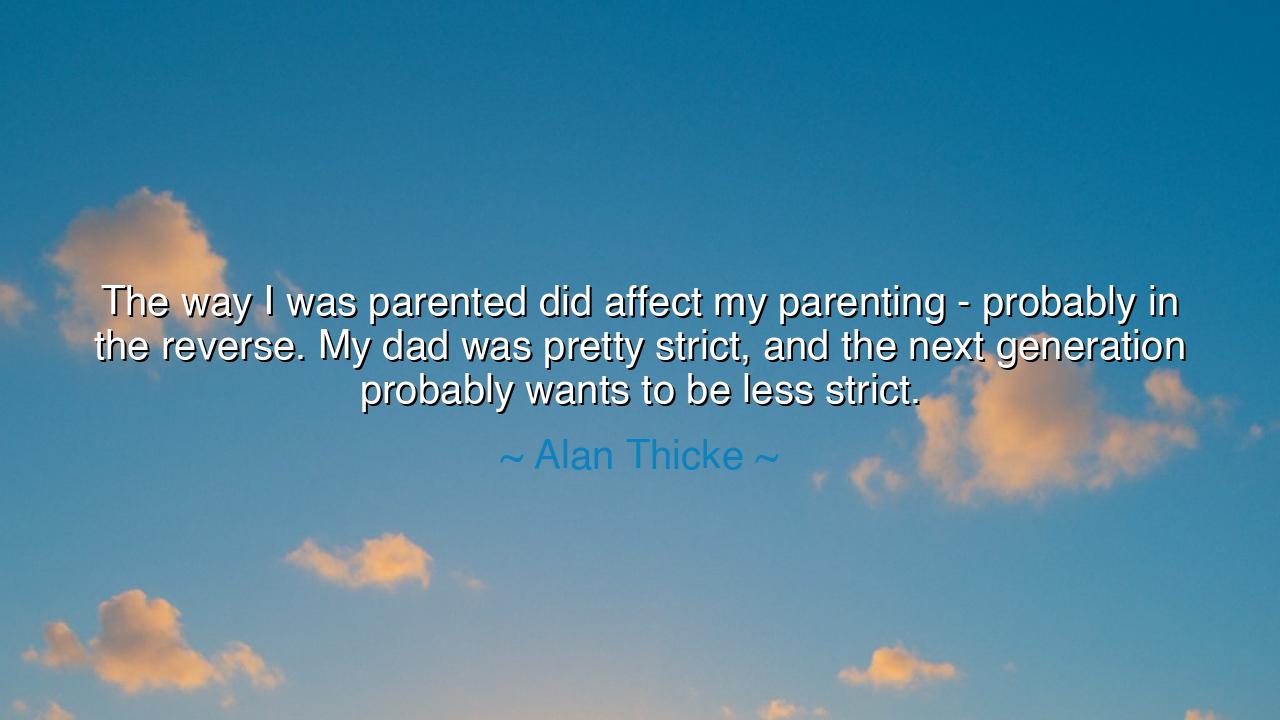
The way I was parented did affect my parenting - probably in the
The way I was parented did affect my parenting - probably in the reverse. My dad was pretty strict, and the next generation probably wants to be less strict.






Hear the words of Alan Thicke, who spoke not only of himself, but of the rhythm of generations: “The way I was parented did affect my parenting – probably in the reverse. My dad was pretty strict, and the next generation probably wants to be less strict.” In this saying lies the eternal cycle of family life, where each generation shapes its ways not only by imitation, but also by resistance. For children do not only inherit the ways of their parents—they also remember the weight of those ways, and often seek to lift or lighten them when they themselves take up the mantle of parenting.
In ages past, discipline was the dominant measure of love. Strict fathers and stern mothers ruled their households with command, believing order was the soil from which virtue would grow. And indeed, structure has its wisdom, for without boundaries the young may falter into chaos. Yet, as Thicke reminds us, children raised under strictness often remember not only the lessons learned but also the wounds carried. When they themselves become parents, they may turn the wheel in the opposite direction, softening severity with gentleness, hoping to heal in their children what was hardened in themselves.
History gives us many such cycles. Consider the emperors of Rome: Augustus, founder of empire, raised his household with severity, demanding virtue and obedience. Yet his descendants, weary of the harshness, grew indulgent, seeking pleasures where their father had demanded duty. The pendulum of parenting swung back and forth—too much strictness, followed by too much leniency. Thus, the story of Rome reflects the story of every household: children respond not only by carrying tradition, but by reshaping it in contrast.
Thicke’s words also remind us of humility. For no parent can escape the influence of their upbringing. Even when we choose the reverse path, we are still tethered to the example of our mothers and fathers. The “reverse” is itself a reaction, proof that we are still marked by the old ways. The child of strictness longs for freedom; the child of indulgence may one day long for order. Thus, parenting is never created in isolation, but always shaped by memory, for better or worse.
Yet this is not cause for despair, but for wisdom. The parent who remembers the pain of too much sternness and chooses kindness is honoring love in their own way. The parent who sees the folly of too much freedom and chooses structure is also acting out of care. In each case, the lesson is the same: the errors of one generation can become the corrections of the next. And though perfection may never be reached, the striving itself is noble.
The lesson, then, is clear: reflect upon your upbringing, but do not be ruled by it. Honor the good, learn from the flaws, and let your parenting be not a blind repetition, nor a blind rejection, but a conscious act of love. For children are not healed by extremes—neither harsh command nor careless freedom—but by balance, where discipline is softened by tenderness, and freedom is guided by wisdom.
Therefore, let all who hear these words take action: examine your past, acknowledge its influence, and choose with intention how you will raise your children. Do not parent by reaction alone, but by reflection. In doing so, you will honor your parents, not by repeating their errors or denying their humanity, but by building upon their legacy with greater balance.
Thus Alan Thicke’s words, simple and reflective, carry the weight of ancient truth: the past shapes the present, but the present may choose its own path. Parenting is not the shadow of one generation over another, but the dialogue between them, ever evolving, ever striving, ever bound by love.






AAdministratorAdministrator
Welcome, honored guests. Please leave a comment, we will respond soon